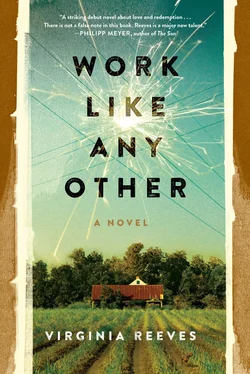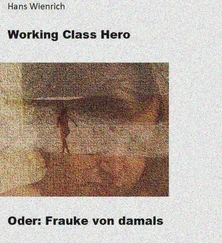“How could I stay here?”
I watched a look pass between Moa and Wilson, another between Jenny and Moa.
“Will you excuse us, Jenny?” Moa asked.
I was proud of the girl when she said, “No.” She’d grown brave in the short time I’d been there — courage building with every meal she brought, every lie she told.
“Please excuse yourself,” Moa said. “I know we’ve put you in the midst of all this, but we need to talk to Roscoe alone for a moment.”
“I know everything there is to say.”
“Listen to your mother,” Wilson said. “Go on now.”
“Yes, Papa.”
I remembered Moa’s words eliciting quick compliance in the past, her directives always followed. Wilson had been the softer of the two. But their roles had clearly swapped in my time away, and I resisted the envy that rose in me for two people together long enough to become each other.
Jenny nodded at me out of support, I chose to think, and then she left the room. The stairs creaked under her feet as she climbed to the second story. We listened to her footsteps move down the hall, the doorknob turn, a few more steps, the firm latch of the door closing.
“Seems she’s gone,” Wilson said, but Moa shushed him.
After a few more steps, the scratch of a record floated down to us, one of Marie’s. The notes slid right into their slots in my memory.
“Come here,” Marie had said. We’d been in our tiny sitting room — I’d just come home from a day topping poles — and she’d taken my hands. “Isn’t this the very best music you’ve ever heard?” We’d danced round that small room, to this very song, and she’d rested her head against my chest, just as she was supposed to.
“It’s called ‘The World Is Waiting for the Sunrise,’ ” she told me. “Can you hear the longing in it?”
“Yes.”
I can hear it.
I imagine Jenny hearing it, too, listening to it right now.
Maggie had long finished her food and lay chewing on a bone over by the stove. Moa poured our coffee. “Jenny’s right that she knows most everything we’re about to tell you. I just didn’t want her to see your reaction, which is me asking you to keep as calm as you’re capable of while we give you the news we’ve got to give. Can you do that?”
“Yes, ma’am.”
“Thank you, Ross,” Wilson said.
Trouble was growing in me.
“Now, you’ll have to go through this whole thing again with Gerry when he visits next, but I suppose it’s best you hear it from our mouths so you have a chance to calm down before seeing him. He’s missed you, Roscoe, and he wants you in his life.”
“All right.”
Wilson took over. “Whether the blame of our hardships fell squarely on you or not, Marie put it there, and she did her best to get Gerry to put it there, too.”
Moa was nodding. “Wilson tried to talk to her about it a couple times. Imagine you know as well as we do how stubborn Marie can be. There was no budging on this particular matter. But I bring this up only to assure you that none of this is Gerry’s doing.”
“You’re making me nervous, Moa.”
“Hell”—Wilson chuckled—“me, too.”
Moa held tight to her mug with both hands. She took a breath that seemed to last minutes, the inhale draining all the air from the room, the exhale bringing it back. “Marie’s divorced you, Roscoe. It’s been years now.”
I expected anger, a great circulating current. I waited for it, clenching my fingers round my mug, readying to throw it against that damn wallpaper, splattering those tiny people with their huge flowers, a great stain to mar that shiny room.
Moa and Wilson watched me.
But my hand couldn’t bring that mug high enough to throw it. Instead, I took a sip of the coffee Moa had brewed for us. Coffee was a treat still, having been gone for so long. I worry that I’ve grown too used to some comforts now, coffee just a part of my life like sleeping in a bed and waking in a room and working my own hours. All these things are privileges.
“Ross?” Wilson asked.
“Just taking it in.” Then I found a question. “How?”
“She got your signature on the papers the one time she visited,” Wilson said. “You were injured. She told us you were fully conscious and in agreement, but I recognized the lie in that the day I picked you up — asking me about whether she’d visited at all.”
“Why didn’t she just ask me when I was awake?”
“We can’t answer that, Ross.”
“But there are things we can tell you,” Moa assured. “It’s this next part that we wanted the time for — the time with you here.” The swiftness in her speech felt like panic. “Once Marie paid off the power company and we got back the electricity, the farm did well. We all did well. Six months after Wilson returned, Marie chose to leave, though. She moved down to Mobile for a teaching position. She took Gerald, against his wishes, and she insisted we move in here to keep up the maintenance. A little over a year later she came back with a lawyer who’d drawn up a bill of sale for the house and property.”
“She sold it to us for a hundred dollars,” Wilson said.
“A hundred dollars we’d already given her — taken from wages. She wouldn’t let us argue.”
I was thinking of the divorce, trying to see it, to place it within the time I’d known in Kilby. Marie had been absent, but she had played the role of wife in my mind, a silent wife, an absent wife, even at times a figment of a younger wife, but she was still—always — the woman I had married, the woman I was married to still.
“Ross?”
“It’s a lot to take in,” Moa said.
I traced the story they’d given me — from my furtive divorce to the lawyer’s visit. “This is yours? You own the land?”
“Yes,” Wilson said.
“And you chose to bring me back here?”
They nodded, and I looked between them, a foreignness settling around me. Marie’s father’s land handed over to the people hired to till it, and those people my new custodians. I was in the cottage because of them, because of the mercy they’d shown.
“You’ll have to forgive me,” I told Wilson and Moa, a desperation stirring, a need for escape so fierce I couldn’t finish the thought. I couldn’t even say I was going before I was moving away. I paused only for a moment — there at the door, long enough to call Maggie to my side.
Ispent the next days burning the old roof mulch and laying tarpaper across the dry planks. Twice, I’d packed and then unpacked a bag. The second of those times, I’d left, making it to the original power line running along Old Hissup Road, belongings on my back, dog at my side. My transformers stopped me, all three of them there, rusted, quiet ghosts of the creations they’d been. The combination sent me back to the cottage, unsure of the part that was mine — the wires with their live currents or the broken-down transformers that’d long been replaced.
Then Jenny arrived. “Will you come up to the house? Gerald’s here.”
I’d slept fitfully since my talk with her parents, questions keeping me awake, wispy things, crippled and dark.
I let Jenny lead us into the meadow, the grass crumpled, the burned mulch a dark circle, and then the big house came into view, its glinting windows and bright siding.
I stopped at the porch steps, Maggie’s nose in the pits of my knees.
“Come on,” Jenny said, but I didn’t know that I was ready for another conversation about my former wife and her property.
Finally, Jenny took my hand.
My toes caught on every stair, and only Jenny’s grip kept me from stumbling. We climbed for hours, it seemed, though there were only six steps. The porch, too, had grown. Its planks stretched far away to the front door, a mile at least.
Читать дальше












